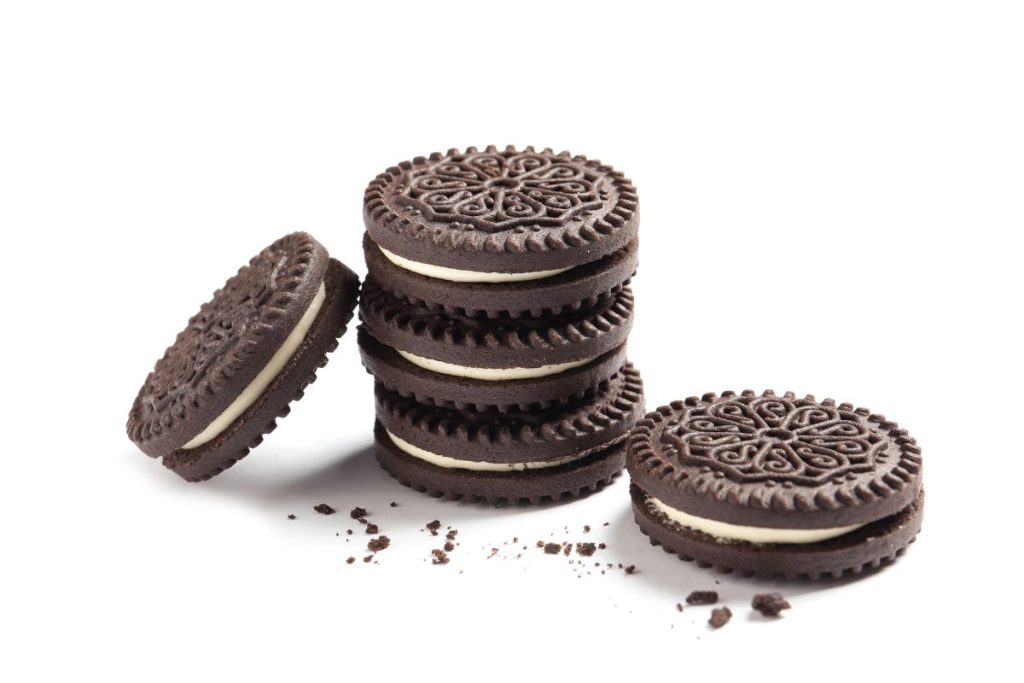Hey there, food explorers! So, you’ve got a question that’s been bugging you, huh? “Are Oreos halal?” Well, you’ve come to the right place!
We’re about to embark on a tasty journey into the world of Oreos and halal food. So, grab a comfy seat, maybe a snack (an Oreo, perhaps?), and let’s dive right in.
Oreos. They’re more than just a cookie, they’re a global phenomenon! These little rounds of chocolatey, creamy goodness have been delighting taste buds around the world for over a century.
But today, we’re not just interested in their deliciousness. Oh no, we’ve got a bigger question on our minds. We want to know if they’re halal.
But before we can answer that question, we need to take a closer look at what it means for a product to be halal.
What Makes a Product Halal?

Alright, let’s take a step back for a moment. Before we can answer whether Oreos, or any other food for that matter, are halal, we need to understand what makes a product halal in the first place.
So, what does it mean for a food to be halal? Well, let’s break it down.
The word "halal" is an Arabic word that translates to "permissible" in English. In the context of food, it refers to foods that are permissible according to Islamic law, as defined in the Quran.
But it’s not just about the food itself. Oh no, it’s about the whole process from start to finish.
First off, the ingredients. For a food to be halal, all its ingredients must be halal. This means no pork or pork by-products, no alcohol, and no blood.
Also, any meat used must come from an animal that has been slaughtered according to Islamic law.
But it doesn’t stop there. The preparation and processing of the food must also be halal. This means that the food must not come into contact with anything haram (forbidden) during its preparation or processing.
This includes things like utensils and equipment that have been used to prepare or process haram foods.
So, to sum it up, for a food to be halal, it must be made with halal ingredients and prepared and processed in a halal manner. It's a holistic approach that takes into account the entire food production process.
Got it? Great! Now, with this understanding, we can better assess whether specific foods, like Oreos, are halal.
What are Oreos?

Alright, let’s get down to business. Oreos. What are they? Well, if you’ve been living under a rock for the past century, let me enlighten you.
Oreos are a type of sandwich cookie consisting of two chocolate wafers with a sweet creme filling in between.
They’re like the yin and yang of the cookie world, a perfect balance of chocolatey bitterness and sweet creaminess.
Since their introduction by Nabisco in 1912, Oreos have become one of the best-selling cookies in the United States.
But their popularity isn’t limited to the U.S. Oh no, these little rounds of deliciousness have fans all over the world. From China to Chile, Canada to Cameroon, Oreos are loved far and wide.
But here’s the thing. While Oreos might be universally loved for their taste, when it comes to dietary restrictions, things can get a little complicated.
And that’s why we’re here today. We’re not just asking if Oreos are delicious (because let’s face it, we all know they are), we’re asking if they’re halal.
So, now that we know what Oreos are, let’s take a closer look at what goes into them.
Ingredients of Oreos:
Ok, so what’s in an Oreo? Well, if you flip over a package of Oreos, you’ll find a list of ingredients that includes:
Unbleached enriched flour, sugar, palm and/or canola oil, cocoa, high fructose corn syrup, leavening, soy lecithin, salt, chocolate, and artificial flavor.
Sounds pretty straightforward, right? But when it comes to whether a food is halal or not, it’s not just about the ingredients themselves, but also about how they’re sourced and processed.
Let’s break it down a bit. The unbleached enriched flour, sugar, cocoa, high fructose corn syrup, leavening, and salt are all pretty standard ingredients that you’d find in many baked goods.
They’re all plant-based and don’t pose any issues in terms of being halal.
The palm and/or canola oil, soy lecithin, and chocolate are also plant-based, but there can sometimes be concerns about how they’re processed.
For example, some chocolates are processed with alcohol, which would not be halal. However, the chocolate in Oreos is not processed with alcohol, so it’s halal.
The artificial flavor is where things get a bit tricky. Artificial flavors can be derived from a variety of sources, some of which are not halal.
So, based on the ingredients, it would seem that Oreos are halal. But let’s not jump to conclusions just yet. There’s more to consider.
Are Oreos Halal?
Alright, it’s time for the moment of truth. Are Oreos halal? Well, based on the ingredients, it would seem so. They don’t contain any animal-derived ingredients, and the artificial flavor is not derived from animals or alcohol.
But, and it’s a big but, there’s more to consider when determining if a food is halal.
You see, being halal isn’t just about the ingredients. It’s also about how the food is prepared.
According to Islamic law, for a food to be halal, it must not come into contact with anything that is haram (forbidden), such as pork or alcohol, during its preparation. This is where things get a bit tricky for Oreos.
Oreos are made in facilities that also process other foods. This means that there’s a chance, however small, that they could come into contact with haram substances.
Now, Nabisco has stated that they have strict cleaning procedures in place to prevent cross-contamination, but the risk is still there.
So, are Oreos halal? Well, if you’re a strict observer of halal dietary laws, you might want to give Oreos a miss because of the potential for cross-contamination.
But if you’re a bit more flexible, you might consider them halal. In the end, it’s a personal decision.
Verdict: Are Oreos Halal?
So, after all that, what's the verdict? Are Oreos halal? Well, it's a bit of a mixed bag. If you're a strict observer of halal dietary laws, you might want to give Oreos a miss because of the potential for cross-contamination and the uncertainty around the sourcing and processing of the ingredients. But if you're a bit more flexible, you might consider them halal.
In the end, the decision is up to you. But no matter what you decide, remember this: there’s a whole world of delicious halal treats out there waiting for you to discover! From halal-certified cookies to vegan sweets that are naturally halal, there are plenty of options to satisfy your sweet tooth while sticking to your dietary principles.
And hey, if you decide that Oreos aren’t for you, don’t sweat it! There are plenty of other delicious cookies out there that are definitely halal. So go forth, explore, and find your new favorite treat. After all, life’s too short to miss out on good cookies, right?
